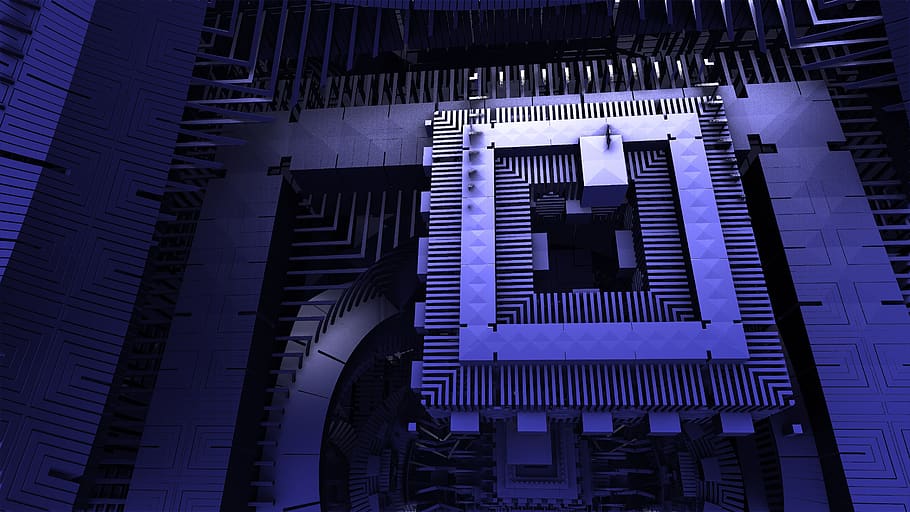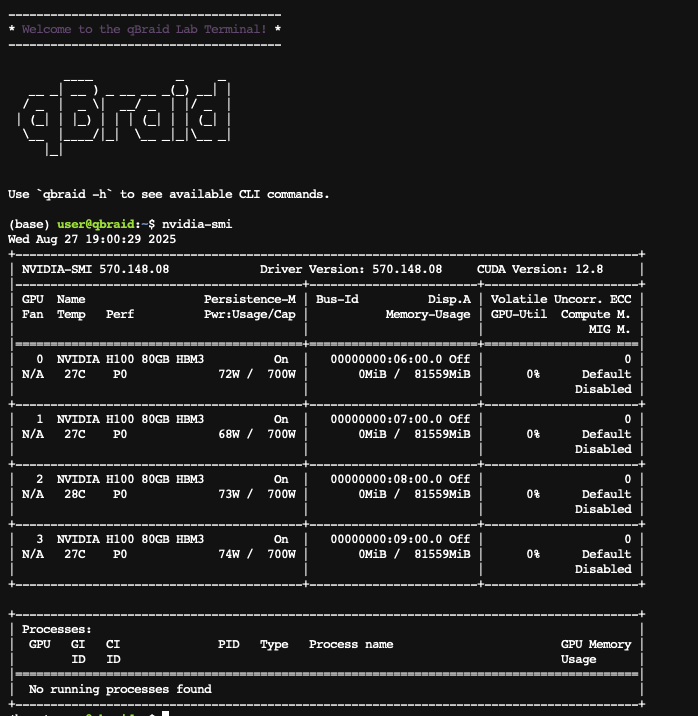Press Releases
10
Min read
qBraid and NVIDIA CUDA-Q are removing the two biggest blockers to AI4Quantum research

Contents:
qBraid, a leading cloud-based platform powering seamless quantum software and hardware integrations, is thrilled to announce its newest offering of zero-setup NVIDIA CUDA Quantum platform with NVIDIA GPUs. This integration is set to democratize access to advanced quantum simulations, offering unparalleled ease of access and the ability to leverage NVIDIA GPUs for accelerated quantum computing simulations.
As an early adopter of the NVIDIA GH200 Grace Hopper Superchip systems, qBraid provides unparalleled access to today’s most advanced computing technologies. Quantum novices and researchers alike can now leverage pay-as-you-go access to the maximum power of GPU-accelerated quantum computing with qBraid at competitive prices.
With CUDA Quantum and NVIDIA GPUs, researchers, students, and developers alike can now effortlessly run simulations on GPUs with access to quantum hardware and software within a single runtime environment on qBraid. This streamlines workflows, reducing the complexity of setup and accessing quantum computing resources, making it easier for anyone to explore and innovate in the quantum space.
Discover the acceleration capabilities of CUDA Quantum firsthand! Explore our demo notebooks included in qBraid Lab GPU environments today. Users can run the demo notebooks on NVIDIA GPU backends — such as V100 Tensor Core, A100 Tensor Core, and H100 Tensor Core GPUs, as well as GH200 Grace Hopper Superchips — by purchasing qBraid credits. qBraid stands out as an elite quantum cloud provider, offering unparalleled global access to GH200 Superchips, which very few provide currently. This exclusive capability underscores qBraid’s commitment to delivering cutting-edge technology and exceptional service to users around the globe.

The integration of CUDA Quantum into qBraid Lab is not only about access; it’s about acceleration. Users of quantum computing software such as Qiskit, Cirq, and Pennylane have already been able to leverage NVIDIA GPU acceleration through cuQuantum on qBraid Lab. CUDA Quantum brings advanced GPU-accelerated backends to more closely simulate actual QPU operations. With NVIDIA GPUs, users can perform exact simulation of ~40 qubit quantum circuits beyond the noisy limits of current QPU hardware. This is a game-changer for circuit simulation, where the memory required grows exponentially with the number of qubits. Through qBraid Lab, users can now tap into the power of multi-node multi-GPU configurations, scaling their quantum simulations to new heights.

qBraid has been selected as one of twelve teams from an immensely competitive worldwide pool to be part of the WellcomeLeap Q4Bio program in advancing biomedical technology. In the program, qBraid leverages NVIDIA Grace Hopper Superchips to accelerate its efforts toward developing novel quantum algorithms relevant to better understand the underlying impacts of amyloid-β and α-synuclein on neurodegenerative diseases such as Alzheimer’s disease and Parkinson’s disease. Owing to its high-bandwidth CPU-GPU interconnect, GH200 outperforms any hardware on the market, allowing for users to gain a competitive advantage. Join us today on qBraid and start setting record-breaking times on your quantum simulations.

Get started by checking out qBraid’s thorough documentation that walks you step by step through the platform.
If you have any questions, please feel free to send us a message at contact@qbraid.com.
Set up an account at account.qbraid.com for free.
About qBraid
qBraid is the definitive one-stop platform for quantum computing. As a deep-tech software-as-a-service startup based in Chicago, qBraid provides seamless access to quantum software and quantum computers through its development and deployment platform. The qBraid coding platform allows for automatic setup of difficult quantum software packages with integrations to quantum hardware provided by AWS, IBM, QuEra, Intel, Microsoft, and others to provide their users the best experience doing all things quantum. The open-sourced qBraid SDK allows for turn-key access to quantum hardware where users can code in 6 different quantum frameworks such as Qiskit, Cirq, or Amazon Braket. qBraid is on YouTube, LinkedIn, Twitter/X and Github. For more information on qBraid, visit https://www.qbraid.com.

Press Releases
10
Min read
qBraid and NVIDIA CUDA-Q are removing the two biggest blockers to AI4Quantum research
.png)
Product
5
Min read
We are pleased to have presented qBraid’s Platform-Agnostic Open-Source Tools at the Quantum Computing Devroom in FOSDEM 2025.

Press Releases
8
Min read
Our first cohort of the qBraid Alliance, a partnership with student organizations at leading universities around the country.

Collaborations
3 minutes
Min read
qBraid has been selected by IBM to host their annual Qiskit Global Summer School for the second year in a row.

Collaborations
5
Min read
As an early adopter of the NVIDIA GH200 Grace Hopper Superchip systems, qBraid provides unparalleled access to today’s most advanced computing technologies.

Collaborations
1
Min read
Explore the advantages of cloud-based quantum computing and how it is revolutionizing research and development across various industries

Collaborations
1
Min read
Discover how quantum computing is revolutionizing enterprises, from enhancing cybersecurity with quantum encryption to optimizing complex logistics and supply chain operations.

Collaborations
5
Min read
qBraid’s quantum computing platform adds access to 256 qubit neutral atom quantum computer, Aquila by QuEra.

Collaborations
5
Min read
qBraid and Quantum Algorithms Institute partner to accelerate the pace of quantum computing in British Columbia and beyond.

Collaborations
4
Min read
The qBraid platform will allow users to play with Pulser in a matter of a few minutes.

Hackathons
5
Min read
As part of QHack, qBraid is providing the best quantum developer notebook environment experience for challengers.

Hackathons
10
Min read
From October 21st to November 5th of 2022, qBraid hosted HAQS, one of the most popular quantum computing events of the year, where participants from around the world worked on solving a total of five quantum computing challenges during the two weeks of the event.

Hackathons
5
Min read
At this year's QCHack, participants attended a week filled with amazing talks, 1:1 sessions with academic and industry mentors, and a 24 hour hackathon hosted by Stanford, Yale and Berkeley.
-min.jpeg)
Hackathons
4
Min read
The potential of the field of quantum computing is so huge that everyone in the field cannot wait for all the promises that the field holds to become a reality.

Research
5
Min read
IEEE has awarded qBraid and its collaborators 1st place for the Best Paper Award in the Quantum Algorithm Track.

Research
1
Min read
qBraid's team used hybrid classical-quantum algorithms to determine the best flight path

Research
1
Min read
Learn how classical sampling methods, such as Markov Chain Monte Carlo, can estimate truncation errors in simulating bosons on quantum computers, aiding resource assessment and result validation for quantum simulations, including applications in two-dimensional lattice scalar field theory.

Press Releases
2
Min read
qBraid wins NSF POSE grant to build open source ecosystem

Press Releases
10
Min read
qBraid and NVIDIA CUDA-Q are removing the two biggest blockers to AI4Quantum research

Press Releases
8
Min read
Our first cohort of the qBraid Alliance, a partnership with student organizations at leading universities around the country.

Press Releases
5
Min read
Coming from IBM Quantum Lab? Learn how to start using qBraid Lab

Press Releases
10
Min read
The Bloch develops quantum technology solutions for society’s most pressing problems by accelerating industry adoption to drive research commercialization, catapulting US leadership in quantum information science and technology.

Press Releases
5
Min read
Our newest podcast series

Press Releases
5
Min read
qBraid will lead a team of researchers from MIT, UChicago, Argonne National Laboratory, and QuEra to develop quantum computing solutions for studying the interaction of metals and intrinsically disordered proteins.

Press Releases
Min read
OSU uses qBraid for accessing Intel Quantum SDK

Press Releases
5
Min read
qBraid provides agnostic connections to quantum computers and simulators thanks to Amazon Braket

Press Releases
10
Min read
Duality Quantum Accelerator Accepts Six Startups into Inaugural Cohort

Press Releases
1
Min read
Take the QuBes (Quantum Beginners) course to learn quantum computing.

Press Releases
5
Min read
qBraid aims to increase accessibility to, and interoperability amongst, quantum computing resources.

Product
3 minutes
Min read
Supercharge your quantum workflows with GPUs on qBraid
.png)
Product
5
Min read
We are pleased to have presented qBraid’s Platform-Agnostic Open-Source Tools at the Quantum Computing Devroom in FOSDEM 2025.

Product
5
Min read
Accelerating hybrid workflows using Pennylane's embedded simulators with NVIDIA GPUs on qBraid Lab.

Product
5
Min read
Here are 3 ways to install python packages on qBraid

Product
2
Min read
How to install Cirq v1.2.0 environment on qBraid Lab

Product
1
Min read
Let qBraid help you take your first step into the quantum world!

Product
1
Min read
Intel® Quantum SDK is generally available on qBraid Lab for Free with no installation necessary

Product
1
Min read
Dive into the intricate interplay of the Bernoulli line and the Bloch sphere, revealing profound geometric insights into quantum state dynamics.